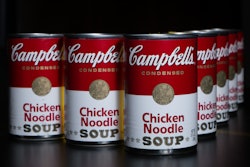FAIRFAX, Va. — Oct. 12, 2016 — InfinityQS International, Inc., in a white paper released this week, shares seven tools that help global manufacturers effectively manage and comply with the Food Safety Modernization Act (FSMA) and other food safety regulations. These regulations aren’t just tick-box exercises; they’re drivers to identify and develop superior best-practices across manufacturing operations. The increasing availability of the tools that facilitate higher levels of manufacturing productivity and quality creates an opportunity for manufacturers to embrace a fresh mindset and leverage prevention and traceability regulations to improve safety, increase revenue, and elevate brand reputation.
These seven tools not only support food safety, prevention, and traceability practices, but also drive higher levels of manufacturing productivity and quality across supply chains.
• A Centralized Quality Data Hub — Managing growing volumes of data across multiple views, including lines, sites, and plants, is a significant challenge for any business. Centralizing product quality and safety data in one place gives manufacturers visibility across the entire enterprise, allowing them to identify potential issues, and focus time and resources on proactively solving problems.
• Universal Naming Conventions — Monitoring food quality and safety to quickly identify potential problems requires access to data that can be easily manipulated. One small way to make data easier to navigate is the use of universal naming conventions. With common naming conventions and a centralized data hub, reports can be created that quickly identify which plant and line produced the problematic product. Plant manufacturers can then pull the defective product, often before it leaves the plant or even production line, avoiding costly and brand-impacting recalls.
• Dynamic Sampling Reminders — Sampling and testing food early in the production process is critical to food safety. It’s no longer enough to sample or inspect food once it has come off the production line. With automated sampling reminders, busy operators in complex manufacturing environments can make sure quality and safety checks take place on time.
• Real-time Statistical Process Control (SPC) — Prevention isn’t possible if data are old and products have already come off the line, or if the defect data have minimal or missing context. With SPC data analytics and control charts that update in real-time, potential problems are identified before they result in ruined food.
• Automated Alarms — Automated alarms can be used to alert key personnel when tests violate specification, warning, or control limits. They ensure all operations are running smoothly without the need to constantly monitor every line in every plant.
• Lot Genealogy Reports — These reports create a complete view of the incoming/outgoing product relationship. This allows supply chain professionals to track raw material lot codes throughout manufacturing operations and ensure full traceability according to federal regulations.
• Cloud-based Food Safety Management — Quality management technologies in the cloud offer distinct benefits for food manufacturers. Supported by world-class hosting partners, these solutions are highly secure and available. For manufacturers with limited IT resources, cloud offerings eliminate the burden of installing on-site hardware, and maintaining software updates and licensing.
Cloud services enable manufacturers to extend technology beyond their own four walls and into supplier operations. Employing these tools across the value chain elevates quality operations with best practices, and ultimately makes it much easier to meet stringent food safety requirements.
For more information on these seven tips and other recommendations to manage and comply with the Food Safety Modernization Act, download the full white paper (PDF).
About InfinityQS International, Inc.
InfinityQS International, Inc. is the global authority on enterprise quality. The company’s manufacturing intelligence platform delivers unparalleled visibility across the enterprise, from the shop floor to the boardroom, enabling manufacturers to re-imagine quality and transform it from a problem into a competitive advantage. Powered by centralized analytics, InfinityQS solutions provide operational insight to enable global manufacturers to improve product quality; decrease costs and risk; maintain or improve compliance; and make strategic, data-driven business decisions. Headquartered near Washington, D.C., with offices in Seattle, London, Beijing, and Shanghai, InfinityQS was founded in 1989 and now services more than 40,000 active licenses with more than 2,500 of the world’s leading manufacturers, including Ball Corporation, Boston Scientific, Graham Packaging, and Medtronic. For more information, visit www.infinityqs.com






















